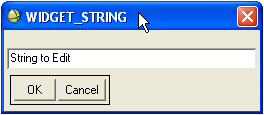This function returns a compound widget used to enter a string, and it returns the base ID of the widget. An interactive ENVI Classic session is required to run this function.

Syntax
Result = WIDGET_STRING(Base [, /ALL_EVENTS] [, /AUTO_MANAGE] [, DEFAULT=string] [, PROMPT=string], UVALUE=value [, XSIZE=value])
Arguments
Base
This is the ID of the base widget.
Keywords
ALL_EVENTS (optional)
Set this keyword to specify that the widget generate an event for all supported events.
AUTO_MANAGE (optional)
Set this keyword to specify that the widget be managed by the ENVI Classic function AUTO_WID_MNG.
DEFAULT (optional)
Use this keyword to specify a default string.
PROMPT (optional)
Use this keyword to specify the prompt string to be used for the widget.
UVALUE
Use this keyword to assign a “user value” to the widget. This value may be of any data type and organization. The user value exists entirely for your convenience. For widgets managed by the ENVI Classic function AUTO_WID_MNG, UVALUE is a tag name in the returned anonymous structure. For user-managed widgets, you can set and use UVALUE however you wish. You must set UVALUE for all compound widgets.
XSIZE (optional)
Use this keyword to specify the width of the widget, in characters.
Widget Event
When the widget is not auto-managed, widget events set event.result to the entered string.
Example
Create a simple compound widget to enter a string value. Print this string.
PRO ENVI_WIDGET_AUTO_BASE_EX
base = widget_auto_base(title='Edit String')
ws = widget_string(base, uvalue='str', /auto)
result = auto_wid_mng(base)
if (result.accept eq 0) then return
print, 'New String ', result.str
END